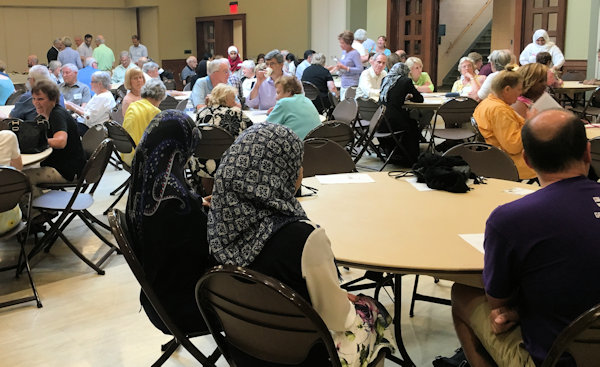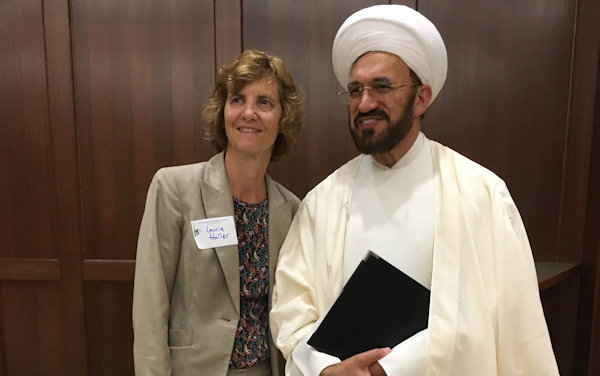Birmingham 1st United Methodist Church and Dearborn’s Islamic House of Wisdom build bridges of truth and understanding.
BISHOP LAURIE HALLER
at Birmingham 1st UMC
“The truth is like a torch. The more you shake it the brighter it becomes.” When David spoke so eloquently on Friday night in our table group, I finally found words to describe what was happening. The Holy Spirit was blowing through our Fellowship Hall like a wildfire, pointing the way to grace, truth and hope.
On Friday evening, a 150 people from Birmingham First United Methodist Church and the Islamic House of Wisdom in Dearborn Heights, Michigan began a journey together. It is a journey of discovery, a journey of repentance and a journey of solidarity. Birmingham First and the Islamic House of Wisdom are entering into partnership with each other to build bridges of understanding between Christians and Muslims in the Detroit Metro Area.
Nearly 3.6 million Americans trace their roots to an Arab country, according to the Arab American Institute. Southeast Michigan has the largest Arab community in the United States and is one of the largest Arab communities outside the Middle East. Arab immigration took off at the beginning of the twentieth century as the exploding auto industry in Detroit attracted immigrants from all over the world.
Imam Mohammad Elahi first gave us an overview of Islam, in which he adamantly denounced Muslim extremism. Then we divided into sixteen table groups for conversation around the beliefs of Islam and Muslim culture. It was made clear from the beginning that our purpose was not to debate or judge but to learn from each other. It is impossible to describe the energy, the buzz, the passion, the “aha” moments, the respect, the smiles and the love of God that was in the room. We were all students together.
More alike than different
On Friday night I learned from my new Muslim friends that we are more alike than we are different. Muslims believe that Mohammed is the last messenger of God and the Quran is the last revelation of God, something Christians do not accept. However, the Imam repeatedly emphasized that Muslims love and respect Jesus. They believe that Jesus was a man of vision and that whoever follows Jesus should have his light.
Like Christians, Muslims want to be good neighbors, raise their children in a safe and peaceful environment and be contributing citizens to our country. One woman from the church told a story of how wonderful her Muslim neighbor is. They look after each other, and one recent afternoon her neighbor sought out Cynthia, offering homemade food, and saying, “I haven’t seen you for a little while. Are you okay?”

When asked which tenets of the Muslim faith are most important to their daily living, our Muslim tablemates David and Jehad said, “We try to be honest and do the right things all day long. The prophet said that if you want to be better, stop lying. To say you are Muslim or Christian means nothing if you do not show it by your actions. The only way to judge people is by their character.”
Jehad added, “Praying at prescribed times during the day is also important, even though some Muslims are embarrassed by praying in public places. I try not to hide my faith.” I wondered how our Christian faith might be deepened if we also had a custom of stopping everything at prescribed times during day to pray. By shaking the torch of truth that our differences do not preclude relationship and friendship, our common humanity shone bright.
Stereotypes cause harm
On Friday night I also realized anew how stereotyping and generalizing about Muslims causes great harm. Imam Elahi reminded us that the vast majority of Muslims are not terrorists. They are peace-loving people who live in a way that models the word “Islam” itself. “Islam” is derived from the root word “salam,” which means “surrender” but also implies “peace” and “safety.”
Imam Elahi explained that the American Muslim community is caught in the middle between extreme Muslim radicalism and American Islamophobia. Muslim terrorists blame the US for all the problems in the world. At the same time, American extremists promote Islamophobia by inciting an irrational fear of all Muslims, not just the very small minority that are terrorists.
Ironically, Muslim extremism and American Islamophobia help each other. Some Americans revel in terrorism because it justifies their Islamophobia. And Muslim terrorists urge Islamophobia in the US because it justifies their hatred of America. The result? Neither side is convinced of the validity of the millions of peace-loving Muslims who are model citizens of our country and contribute in significant ways to the health, prosperity and well-being of our nation.
“Ironically, Muslim extremism and American Islamophobia help each other.”
It was painful to hear stories of how Muslims are often the target of religious and racial bias, including being physically attacked simply because of their accent, appearance or name.
According to the Imam, radical extremism is not found in either the Bible or the Quran. Those who justify killing supposed “infidels” are taking passages in the Quran out of context. In fact, in the Quran, God asks Muslims to sacrifice their lives to save places of worship — churches, synagogues and temples and mosques — rather than destroy them.
Unfortunately, extremists don’t discriminate according to faith. They declare war on all religious freedom, which is against the spirit of our Constitution and the intentions of God. By shaking the torch of truth-telling, the more revealing it becomes that no human being is justified in generalizing and showing bias toward those who are not like them.
Just one at a time
The third learning I came away with is that we change the world one person at a time, one conversation at a time, one kind word and one good deed at a time. By sitting at table together on Friday night, we began a dialogue that will have ripple effects across the Detroit metro area and around the world. By mutually supporting each other, Muslims and Christians witness to the world that we are united in our desire for peace and harmony among all people.
I thank God that the simple things we learned about each other will enable us to shake our torches more strongly so that the truth of our brotherhood and sisterhood will shine brightly. For example, a Muslim custom that can make others uneasy is a woman wearing a hijab or head scarf. While some may assume the hijab to be a sign of submission or consider it dangerous, our Muslim sisters explained that the hijab is an outward sign of faith, similar to a Christian wearing a cross. The hijab also shows honor and respect to Mary, the mother of Jesus, who is the only woman mentioned in the Quran and appears thirty-four times. Unfortunately, as one woman explained, she is treated in two completely different ways depending on whether she is wearing a hijab or not.
Imam Elahi provided the strongest witness to the deepest desires of those who were present on Friday night by saying, “We want to be respectful and loving from our heart. If I hurt anybody, let me know. What unites us is our faith in God, our love for Jesus and our belief in revelation and human dignity. Our differences are minor, and the way we live out our faith is individual. The details we can figure out for ourselves.”
The next time we gather, Birmingham First will travel to Dearborn Heights to meet with their new friends from the Islamic House of Wisdom. Not only will we continue to shake the truth together so that the torch of grace and hope shines brighter, but we’ve also been promised some Lebanese hummus! Thanks be to God!
Last Updated on July 26, 2016

